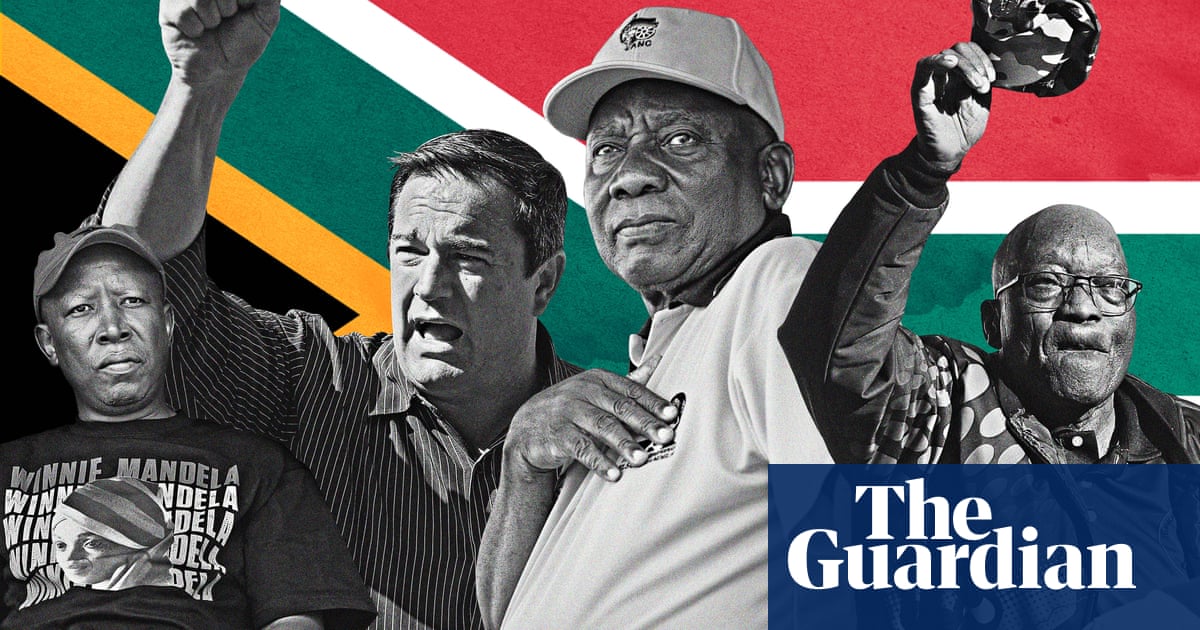South Africans go to the polls on 29 May in elections in which the ruling African National Congress party could lose its majority for the first time since it swept to power in 1994 after the end of apartheid. Chronic unemployment, inequality, power cuts and corruption have contributed to a haemorrhaging of support for the ANC, which won the 2019 election with 57.5% of the vote.
Who are the ANC’s challengers?
The ruling party is battling against established opposition parties such as the economically liberal Democratic Alliance (DA) and the Marxist-inspired Economic Freedom Fighters (EFF). It is also being challenged by upstarts such as the uMkhonto weSizwe (MK) party, led by the former president Jacob Zuma, who is bitterly opposed to the current South African leader, Cyril Ramaphosa.
Polls have consistently shown the ANC getting less than 50% of the vote. A telephone tracking survey by the Social Research Foundation had it on 44.1% of the vote in a 60% turnout model this week, compared with 39.1% a month earlier.
Some analysts think the ANC could still scrape a majority, noting that phone polls often have significant flaws, including underestimating ANC support in rural areas where many poorer votes do not have phones.
Why are these elections important?
South Africans voted Nelson Mandela and the ANC into office in 1994 on a wave of hope. Thirty years later, the mood is bleak. More than four in five adults said the country was going in the wrong direction in a 2022 survey by Afrobarometer, a non-profit African research network, 10 percentage points higher than 18 months earlier.
The ANC losing its parliamentary majority would mark a tipping point for a party that, especially for older and rural voters, still carries the halo of liberation. If it gets more than 45% of the vote, it may be able to form a coalition with smaller parties and continue policies such as trying to end power cuts. But if it gets closer to 40%, it may have to share power with the DA or EFF, which could mean radical policy changes.
What are the key issues?
The lack of jobs is the most pressing issue for South Africans. Almost a quarter of adults told Afrobarometer that joblessness, which has deepened the poverty and inequality that stalk the country, was the most important problem for the government to address.
The unemployment rate hit almost 33% this year, more than 10 percentage points higher than in 1994, with almost half of young people out of work.
South Africans are also fed up with scheduled power cuts known as load shedding, violent crime – South Africa has one of the world’s highest murder rates – and corruption.
What have the parties pledged?
The ANC has promised to learn from its mistakes and warned that “forces” are seeking to undo South Africa’s democratic progress. It has pledged to create 4 million “work opportunities”, introduce national health insurance and a basic income grant, and tackle corruption and illegal immigration.
The DA, the biggest opposition party, has campaigned on the slogan “Rescue South Africa”. Its promises include lifting 6 million people out of poverty and creating 2m jobs, as well as a “balanced approach” to privatising state-owned companies. Many black South Africans see the DA as favouring the interests of white people.
The EFF argues that apartheid did not end in 1994, saying the democratic settlement left the economy in the hands of “white monopoly capital”. It wants to expropriate land without compensation and nationalise companies, including banks and mines.
Zuma’s MK has similarly leftwing economic policies, but dates South Africa’s “prolonged period of national shame” back to 1652, when the first Dutch settlement was established. It also wants to move from constitutional democracy to parliamentary supremacy and to increase the powers of traditional leaders.
How will the elections work?
Almost 28 million South Africans are registered to vote in national and provincial elections, less than half of the 62 million population.
The 400-seat national parliament will vote for the president no later than two weeks after election day. There is no constitutional process for forming a coalition government.
South Africa uses a system of proportional representation. Voters get three ballots – two for the National Assembly, each allocating 200 seats, and one for their provincial legislature. One of the national ballots will only have political parties on it. The second will be for one of nine multi-member provincial constituencies. Voters can either opt for a party, which will list its candidates’ names, or an independent.
This is the first time independent candidates are competing, with just 11 independents out of almost 15,000 people running for office across South Africa, while 70 parties are putting up candidates.

